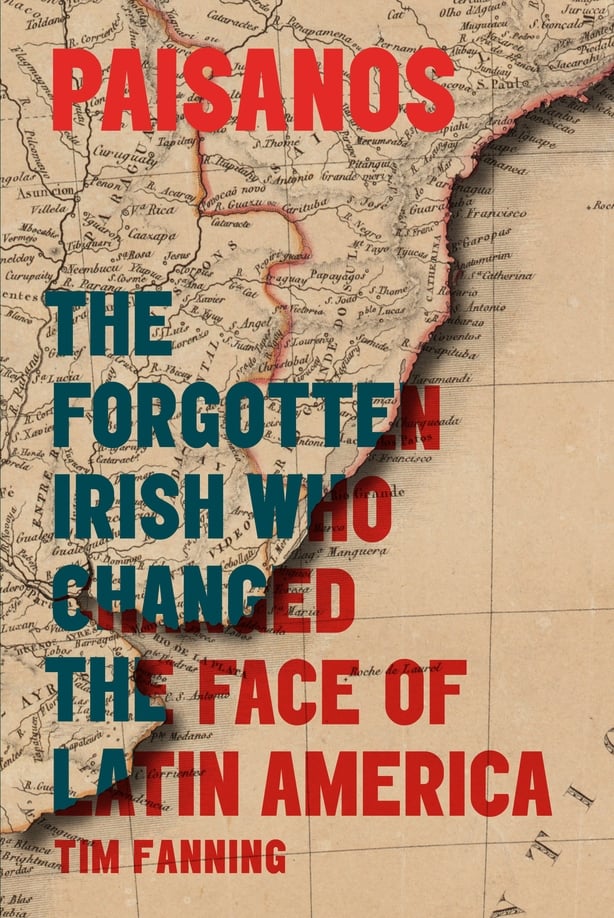Tim Fanning’s new work, Paisanos traces the history of Irish emigration to Latin America, exploring larger-than-life characters such as Eliza Lynch and Bernardo O’Higgins, and taking in the lives too of soldiers, clergymen and merchants in exile.
The book has been hailed by President Michael D Higgins as `an important and necessary volume on the role played by Irish men and women in the emergence of the new, modern and independent republics of Latin America.’
Tim Fanning declares that the 280-page book is intended for anyone who is interested in Irish history. More realistically, the book will attract readers who are interested in Spanish and Latin American history, the curious amongst us, `who might have a vague awareness of Bernardo O’Higgins and William Brown.'
For those who do not have a vague awareness of these two aforementioned gentlemen, suffice to say that Bernardo O’Higgins (1776?- 1842) was the first Chilean head of state or “supreme dictator,” between the years 1817–23 . Commander of the military forces which in time won independence from Spain, he was the illegitimate son of Ambrosio O’Higgins, a Spanish officer of Irish origin who became governor of Chile and subsequently viceroy of Peru. Born in Foxford in June 1777, Admiral Brown played a pivotal role in the battle for Argentine independence, years after his family had emigrated to America in 1786. He died in Buenos Aires in 1857.

Fanning worked briefly some years ago with an English language newspaper on the island of Mallorca where he became interested in modern Spanish history and politics. This led to an interest in the longer and indeed wider Hispanic story. He travelled around South America as a back-packer 11 years ago where he heard the illustrious names of O’Higgins and Brown in Argentina.
“I wanted to dig a little deeper and the more I dug the more I found out just how deep the connections are between Ireland and South America,” says the historian. In the course of his illuminating work, Fanning explores direct emigration from Ireland and also secondary emigration, as it were, the Irish who went to Spain during the era of the Penal Laws and left from there. “They were in the Spanish army or working in Spanish Royal administration, and ended up in South America that way.”

A number of individual studies have been done on Fanning's vast subject, for instance his father Ronan’s 2009 biography of Eliza Lynch, co-authored with Michael Lillis. Eliza Lynch (1833-1886) was a courtesan who in time gained fame and adulation as the unofficial First Lady of Paraguay, or ‘Queen of Paraguay’ as so denominated in the title of the Fanning and Lillis-authored study.
In Paisanos, Tim wanted to bring all the relevant Irish together in one volume. In recent years, the young historian returned to South America to research his new work, visiting Colombia, Chile and Argentina. “ The people were very open and interested when I explained that I was an Irish researcher and that I was interested in the Irish who came to Latin America, going back hundreds of years.” He delved into archives in Bogotá, in Santiago de Chile, but found “a much greater awareness of the Irish contribution in Argentina.” Searching in archives in Buenos Aires, he read of the thousands who arrived in that country in the early to mid nineteenth century, many coming from the counties of Westmeath, Offaly and Longford.
He was amazed to read of the Irish soldiers, also running to thousands, who fought for Simón Bolivar around 1820, in Venezuela and Colombia. They risked yellow fever and any number of myriad illnesses by the baleful waters of the river Orinoco, aside from the prospect of losing their lives or being grievously wounded in battle.
“The Irish were very good at assimilating, " says Fanning. "You had emigrants with names like O’Donoghue, O’Reilly and Lynch who were Spanish-speaking, but they were also aware of their family being Irish and they would refer to each other as paisano, which means `fellow country-man.’ They shared this link with the homeland in Ireland."
Tim Fanning’s interest in Spanish history continues and he has written an as yet unpublished book on the life of the Cavan priest Alexander McCabe, who was Rector of the Irish College in Salamanca during the Spanish Civil War.
Meanwhile, there is Paisanos to be getting on with, hailed by President Michael D Higgins as `a welcome contribution to the literature on the history of our exiles and their descendants."
Paisanos is published in hardback by Gill Books
Paddy Kehoe

